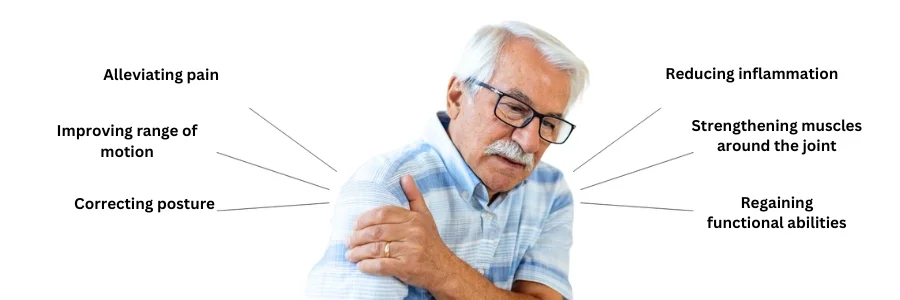
Does Your Shoulder Feel Like “Frozen” in a Place?
If you feel as if your shoulder is stuck and difficult/ painful to move around, making simple tasks like raising your arm challenging, take the first step towards relief.
Our dedicated team of professionals is experienced in addressing these issues, tailoring treatments to your specific needs, and supporting you on your path to recovery. Access physiotherapy for shoulder pain/ frozen shoulder now.
Has this been happening to you lately?
Limited Arm Raise
Difficulty in raising your arm or reaching behind your back?
Persistent Pain
Persistent shoulder pain that limits your range of motion
Shoulder Stiffness
Stiffness and tightness in the shoulder, particularly at dawn or dusk
Task Difficulty
Trouble with everyday tasks like getting dressed or combing hair due to shoulder discomfort
Radiating Arm Pain
Pain that radiates from the shoulder to the upper arm
Night Discomfort
Increased discomfort in the shoulder at night, which can affect sleep quality
Loss of Strength
Progressive loss of shoulder strength, impeding activities
Mobility Loss
Incremental loss of shoulder mobility over time
What could have caused your frozen shoulder?
There is no clear definite reason but there could be a few factors that might have contributed to this condition, especially in your midlife.
A shoulder injury or a surgery due to which you couldn’t move your shoulder for a few days could be the culprit. Certain conditions, such as diabetes, thyroid disorders, or autoimmune diseases may increase your chances of developing a frozen shoulder. Also, hormonal changes during midlife, especially for women, have been linked to a higher risk of developing a frozen shoulder.
Physiotherapy for shoulder pain will help you recover by

FAQs related to Frozen Shoulder
What is a Frozen Shoulder?
In simple terms, frozen shoulder is a condition in which your shoulder stiffens, hurts, and is difficult to move. The tissues around the shoulder joint become dense and constrictive. It often progresses through three stages: first, your shoulder begins to stiffen; second, it becomes extremely difficult to move; and third, it begins to improve and become more mobile again.
How long does a frozen shoulder last?
A frozen shoulder may last for a long period. A full recovery might typically take a few months to a few years. The length of time can, however, differ from person to person, with some experiencing shorter periods and others enduring longer. The condition can be managed and improved with time and regular treatment.
How does a Frozen Shoulder feel?
Your shoulder will feel tight and uncomfortable if you have a frozen shoulder. You can find it difficult to move your arm, and your shoulder joint might feel dull or painful. Your ability to carry out daily activities that require shoulder movement may be hampered by the discomfort, which can range in intensity from mild to severe.
Is Frozen Shoulder a serious condition?
Although frozen shoulder is not a life-threatening condition, it can have a big influence on your regular activities. It can hinder your ability to carry out daily chores by causing shoulder pain, stiffness, and reduced mobility. Most patients with frozen shoulder recover with the right care and treatment, although it could take some time and persistence to fully recover shoulder function.
Is a Frozen Shoulder curable by physiotherapy?
Yes. Physiotherapy for shoulder pain / frozen shoulder has shown good results. Exercises, stretches, and manual therapy methods are used in physiotherapy to increase shoulder mobility, lessen pain, and restore function. However, the length of recovery might vary, and regular attendance at physiotherapy sessions is essential for the best outcomes.
How do I know if I have a Frozen Shoulder?
Think of pain and difficulty in daily activities like reaching for objects placed on high shelves or cabinets, changing clothes, combing or brushing hair – particularly if the hand needs to be raised above shoulder level, reaching the seatbelt or fastening it in a car, and throwing a ball or lifting objects above shoulder height. If your shoulder feels stuck and hurts while doing such activities, seek professional help.
Is Frozen Shoulder related to aging?
Although it can happen to anyone, frozen shoulder is more prevalent in adults over the age of 40. The actual cause of a frozen shoulder is still unknown, but aging is a risk factor. Frozen shoulder may ahttps://telephysio.in/we-help/senior-citizens/lso occur as a result of additional circumstances such as trauma, underlying medical disorders, or prolonged immobilization.
Does anxiety lead to Frozen Shoulder?
While anxiety and stress can lead to muscle tension and discomfort, there is no direct evidence linking anxiety to frozen shoulder. Usually, injuries, inflammation, or underlying medical issues lead to frozen shoulder. The control of stress and worry, however, can be advantageous for general health and may indirectly assist in the management of symptoms of frozen shoulder.
How can I prevent Frozen Shoulder?
There are certain precautions you can do to lessen the risk, even if frozen shoulder is not always preventable:
Continue to move your shoulders regularly and do some light stretching.
Prevent immobilizing the shoulder joint for an extended period of time, especially after an injury or surgery.
Manage your medical problems well if you suffer from diabetes or thyroid issues because they can raise your risk of developing frozen shoulder.
What happens if a Frozen Shoulder is left untreated?
If left untreated, a frozen shoulder can lead to persistent shoulder stiffness, pain, and limited mobility. It also leads to sleep disturbances, muscle imbalance, functional limitations and decreased quality of life.
Can I massage a Frozen Shoulder?
A doctor or therapist should supervise frozen shoulder massage. Gentle, regulated massage may help manage symptoms by relieving muscle tension and increasing blood flow. However, vigorous manipulation or force may aggravate the problem or cause discomfort.
Is surgery required for Frozen Shoulder?
Frozen shoulder surgery is rarely recommended. Physiotherapy, pain management, and anti-inflammatory medicines help treat most instances. In rare circumstances, surgery may be considered to relieve tight tissues and increase shoulder mobility. Surgery is usually decided case-by-case with a doctor.
Can I lift weights with Frozen Shoulder?
Weightlifting is risky with a frozen shoulder. It may lead to future discomfort or aggravation of the problem. Thus, you should avoid heavy lifting or activities that strain the shoulder. Light resistance exercises advised by a doctor or physiotherapist may help shoulder mobility and rehabilitation.
Do pain killers help treat a Frozen Shoulder?
Painkillers can relieve frozen shoulder pain but not the underlying issue. NSAIDs or over-the-counter painkillers can help make physical therapy exercises and activities more comfortable. However, to treat the frozen shoulder’s cause and find the right medication, visit a doctor.
What are Frozen Shoulder treatment options?
Frozen shoulder can be treated with:
1. Physiotherapy for shoulder pain: Gentle exercises, stretching, and range-of-motion procedures to increase shoulder mobility and lessen pain.
2. Pain Management: Over-the-counter or prescription painkillers.
3. Injections: Corticosteroid injections by a doctor can temporarily reduce shoulder joint inflammation and pain.
Consult a healthcare professional to identify the best treatment approach for the patient.





